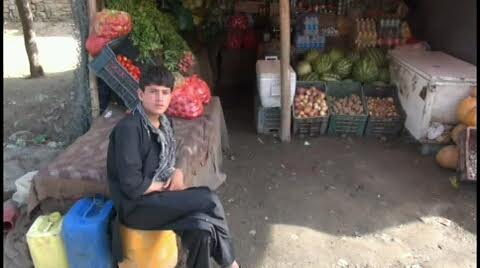CHARIKAR (Pajhwok): Pajhwok Afghan News’ findings show businesses have declined by 42 percent in Charikar, the capital of central Parwan province, over the past two years due to a variety of factors, including insecurity and withdrawal of foreign troops.
A number of artisans interviewed by Pajhwok complained their businesses had been on the nosedive since 2014.The skilled workers, officials and experts linked the situation to the worsening political situation, insecurity and a cut in aid to Afghanistan.
Faqir Agha Yousufi, a resident of the first police district of Charikar who owns a carpentry centre, told Pajhwok his business had been on the decline since the 2014 election crisis, foreign forces’ withdrawal and a decrease in foreign assistance.
Sitting in his shop, with no customers in sight, he would make at least 12 types of furniture items before the presidential election debacle. But now he makes only four kinds.“I had seven trainees in my shop in the past, but now only one is working with me.”
While pointing to a nearby carpentry shop that was closed recently, the man said the owner, Aminullah, wound up his business and joined the Afghan National Army (ANA).The current state of affairs was having a negative impact on different sectors, he added.
Mohammad Sherin, deputy director of a gravel production company called ‘Quds-i-Dwom’ in Parwan, said their sales had decreased by 70 percent in the past two years. A few years ago, they had a contract with foreign forces in the Bagram district of the province.
Under the contract, the firm would sell a large amount of products, but now the construction process has stopped.“I have suffered a loss of four million afghanis in the past two years,” he pointed out.
The construction process in other parts of the province had also decelerated, Sherin said, despite the dismal situation, his company remained operational. He hoped the construction activity would pick up again.
Gul Lala Yousufi, 60, runs a fabrics shop in Charikar. He complained his sales were slumping.He said people had lost much of their purchasing power as a result of the economic slowdown. Businesseshad generally gone down, Yousufi confirmed.
“The level of my sales was worth $10,000 a month in the past two years, but now our sales have declined to $1,000,” he said, hinting at closing his shop if the situation did not improve.
“Our president Ghani has traveled to several countries and requested for aid, foreign countries have promised him of aid, but we do not know why the donations not arrived so far as Afghans suffering from bad economic situation,” Yousufi said. He asked the government to provide job opportunities for people and lure investors.
Mohammad Razi Bai, a butcher, said he had never seen such a slump in sales during the past 20 years.“Last year, I sold up to 280 kilograms of meat daily. Now I cannot sell even 120kg,” he admitted. Previously he would earn 5,000 afghanis daily his current sales don’t exceed 2,000 afghanis,so much so that he finds it hard paying his shop’s rent, tax, etc.
Charikar MayorKhwaja Roohullah Seddiqi verified the business deterioration after the withdrawal of foreign troops.However, he called the slowdown a short-term problem, saying the unity government was getting ready to deal with trade problems.
Business centres, which are located outside the city on its periphery, cannot catch the attention of customers. But he claimed the municipality had drawn up a plan to shift business markets to the city centre, including the Kabul-Shamal highway.
He noted illegal gunmen had also created problems for business men in Parwan. Traders evinced little interest in investments as the presence of armed individuals represented a huge threat to their security, the mayor admitted.
Wahid Seddiqi, the governor’s spokesman, confirmed the waning business confidence in Charikar. He said Afghan forces had arrested a large number of illegal armed individuals and others creating problems would be also detained.
Business prospects were generally dim, only in Parwan, but across the country, he explained. However, Seddiqi revealed the government was working on a plan to resolve the problems. “Higher production and competition have also hit businesses.”
A survey by the Afghanistan Chamber of Commerce and Industry (ACCI) in Kabul, Balkh, Kandahar, Herat and Nangarhar provinces indicates a fall in investments and business prospects. The situation was deteriorating with each passing day, it said.
A comparison of the last three surveys shows the business situation has considerably worsened in the wake of the presidential elections. However, expectations remain high, with the business community hoping the government leaders would keep their campaign promises.
mds/mud
Views: 7
